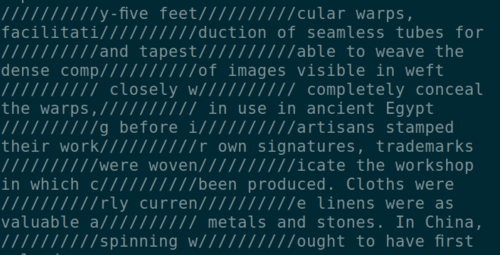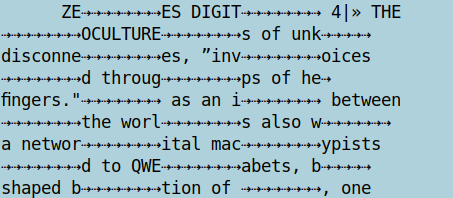User:Alice/Special Issue V
Reader #1
Title and topic
Techno/Cyber/Xeno-Feminism The Intimate and Possibly Subversive Relationship Between Women and Machines
My reader explores topics from women's introduction into the technological workforce, the connection between weaving and programming, and using technology in favour of the feminist movement. One major concept that appears throughout the reader is an almost mystical connection between women and software writing, embedded deep in women's tradition of weaving not just threads, but networks.
Production
I built this reader using only free software. It was designed using HTML and CSS, compiled using Weasyprint, and the cover was designed in GIMP. The printing was done at WDKA. For binding, I decided to keep in line with the concept of weaving, and use Japanese binding with cotton thread.
Research
Research questions:
- Does software have a gender?
- What elements and concepts are revealed when exploring the connection between weaving and programming?
- How have women challenged the imbalance in gender representation in technology?
List of works
In order of appearance in the reader:
1. When Computers Were Women, Jennifer Light
2. The Future Looms, Sadie Plant
3. Zeros + Ones, Sadie Plant
4. A Cyborg Manifesto, Donna Haraway
5. Where Is the Feminism in Cyberfeminism?, Faith Wilding
6. 100 Anti-Theses, Old Boys Network
7. Xenofeminism: A politics for Alienation, Laboria Cuboniks
Software experiments
Exploring further the relationship between weaving and programming First output:
Second output:
Code
<source lang=python>
import linecache import textwrap import sys from sys import exit
class LeavingProgram(Exception):
pass
def parse(program):
cmds = program.split(',')
splitted_cmds = []
for cmd in cmds:
splitted = cmd.split()
splitted_cmds.append(splitted)
return splitted_cmds
#return tokenize(program)
def tokenize(s):
return s.split()
def repl():
while True:
try:
val = eval(parse(input('> ')))
if val is not None:
print(val)
except LeavingProgram:
break
text = None line_number = 0 last_index = 0
def eval(cmds):
global text global line_number global last_index
for cmd in cmds:
if cmd == []:
line_number += 1
last_index = 0
elif cmd[0] == 'load':
contents = open('output.txt').read()
text = textwrap.wrap(contents, 40, break_long_words=True)
print('\n'.join(text))
line_number = 0
last_index = 0
elif cmd[0] == 'show':
print(text[line_number])
elif cmd[0] == 'under':
current_line = text[line_number]
char_number = int(cmd[1]) - 1
char_list = list(current_line)
x=range(last_index, char_number + last_index + 1)
for time in x:
if time < len(char_list):
char_list[time] = u'\u21e2'
last_index += char_number + 1
joined = .join(char_list)
text[line_number] = joined
elif cmd[0] == 'over':
last_index += int(cmd[1])
elif cmd[0] == 'pattern':
pattern = text[0:line_number + 1]
print('\n'.join(pattern))
elif cmd[0] == 'quit':
print('Adios!')
raise LeavingProgram()
else:
joined = ' '.join(cmd)
print('Did not understand command {}'.format(joined))
if __name__ == '__main__':
repl()
<source>


